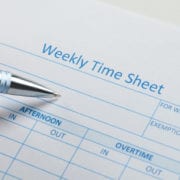Timesheet habits: don’t procrastinate.
Timesheets routinely come up as a bemoaned part of practice, something that no one likes to do. Many lawyers develop the habit of doing timesheets in bulk, usually at the end of the week but sometimes at the end of the month. That’s a terrible habit for a wide variety of reasons.
Unless your notes are truly spectacular (i.e., timesheet quality at least in substance), you will lose time because it simply isn’t possible to remember every single call made or received, every in-firm conversation, etc. I’ve seen some studies showing that lawyers who do end-of-month timesheets can lose up to 30% of their time. That’s bad for the firm and for the attorney.
Approaching billing with this habit of procrastination makes what could be a fairly simple and straightforward task into a Huge Effort. Timesheets become the constant millstone. Sure, you get to ignore them for a month at a time, but then you’ll have to devote at least a full morning and probably longer to reconstructing your time. The longer one waits to prepare timesheets after actually doing the work, the harder it will be to recreate the time and the longer it’ll take to prepare the timesheet. Bad for the firm, bad for the attorney.
Moreover, it appears that clients may move from accepting monthly bills to wanting the ability to monitor lawyers’ work in real time using e-bills. Technology may enable clients to demand not only a budget but also real time updates on how the budget is being used, whether it’s being exceeded, etc. While that system isn’t in effect in the US today, it’s apparently coming in the UK, and lawyers would be well-advised to adapt their habits to minimize the pain if, or perhaps when, e-billing crosses the pond. See also Tom Collins’ posts discussing the reasons for the move to e-billing and describing the software support that will assist in meeting clients’ demands.
If creating timesheets contemporaneously with completing the work is helpful for capturing time, saving time, and preparing for what sounds a lot like the next step toward client awareness and management of the performance of legal services, where’s the downside to developing strong habits? Explore your billing software to see whether it has a timer function — most do. If not, at least use your calendar to mark down your time as you work, and transfer it to a timesheet at the end of the day. This one habit will increase both your productivity and your apparent productivity significantly.




Procrastination isn’t such a big problem if you use a decent timesheet tool. Try ClickTime – http://www.clicktime.com . We use it and our attorneys aren’t nearly as bad as they used to be. And I administer the office billings, so I know…
Molly, thanks for your comment. I agree that the billing software can make a huge difference — that’s what reformed me.